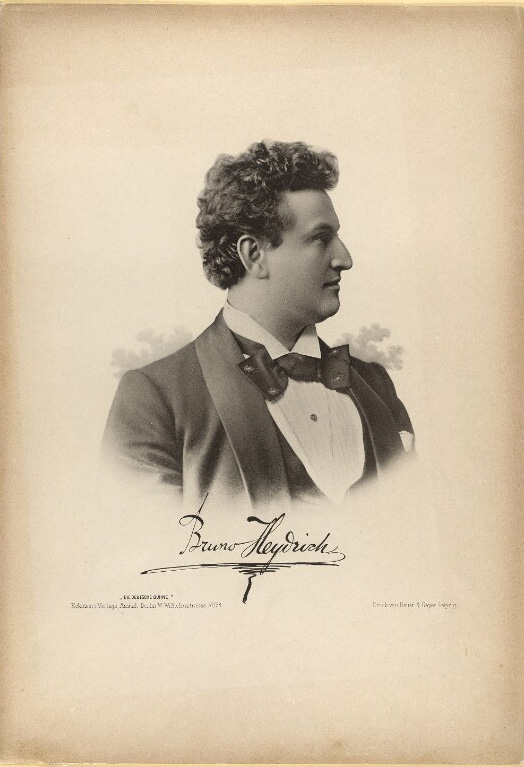Bruno Heydrich Bruno Heydrich was one of the first singers to study in Bayreuth without even being considered for a part. He was one of the smartest and most interesting stage performers. Unfortunately for a great career, he did not have a voice that matched his musical and dramatic talents. Heydrich was born on February 23rd, 1863 in Leuben. In 1879, he entered the conservatory in Dresden and studied violin, tenor horn and tuba. Following the advice of Franz Wüllner, Heydrich studied also voice. His voice seems to have been better than its reputation, otherwise he would not have received a free scholarship. He started as a baritone, and under the voice teacher Scharfe changed to tenor. In 1882, he finished his studies with prizes in composition, piano and double bass. He became a musician with the orchestra at the theatre in Meiningen. In 1883, he played the double bass in Dresden and continued his singing lessons with Feodor von Milde. Von Milde, the first Telramund and a musical authority in Weimar, used the change of director at the Hoftheater to recommend his star student. After guest appearances as Lohengrin and Faust in May 1887, Heydrich received a two years contract. Apparently, Bronsart, the director, hoped for a further development of the 24 years old tenor. The voice gained in power, but the timbre remained the same. In 1889, Heydrich moved to Magdeburg. There he was the first Tristan on March 27th, 1890 before moving to Stettin at the end of the season. In 1890, he studied roles in Bayreuth, one year too late. In 1889, Heydrich would have had the opportunity to replace the always sick Van Dyck or the often canceling Gudehus. Nothing the like happened in 1890, and he left Bayreuth without having sung on stage. Via Stettin and Aachen, Heydrich arrived, after guest appearances as Lohengrin, Tannhäuser and Tristan, in Köln in 1892 under bad conditions. He did not succeed to replace Willi Birrenkoven. In his memoirs published in 1947. Bruno Walter wrote the following: He sang Tristan, Siegmund, and the two Siegfrieds. He had a powerful voice without charm. He was a competent actor. He was a tall, graceless man with a strange character for some reason. The Nazi murderer Reinhold Heydrich was his son. I often thought about that man, who was not a devil, that destiny chose to generate a monster. Better than his singing, Heydrich was a successful composer in Köln. His opera Amen had great success on November 22nd, 1895. It was to be performed in many cities. Heydrich, as a singer, could not stay long, neither in Köln nor his next stop in Braunschweig. Fritz Hartmann wrote the following in 1906 in Braunschweiger Theatergeschichte: Bruno Heydrich (debut roles Siegfried, Tristan and Prophète) was not capable of replacing his predecessors. While Schroetter created a furor with his notes, his voice was baritonal. He replaced his lack of high notes with a high degree of musicality, and great acting capabilities. This did not convince the majority of people. Bruno Heydrich was a real musician whose one act opera Amen confirmed the next year that he was a composer. Curiously in 1895, Heydrich sang the only time in a foreign country, in Antwerp: not as a Wagner hero but as Turiddu and Don José, parts that did not suit him. In 1897, he produced his opera Amen in Braunschweig, where he sang the main role. The Allgemeine Musikzeitung wrote in 1898: When many miss the clear, metallic tenor sound, the artist replaces those defects with inspired musical creative power and good acting. 1898 to 1900, Heydrich was heldentenor in Halle, where he finally settled for good. He opened a private school for music and theater. In 1901, the school became a conservatory and in 1906 received a state concession. In the meantime, he had given up his career. A curiosity was a Siegfried performance in Osnabrück in 1900: the partner of his Siegfried was his brother Franz Heydrich as Mime. Franz Heydrich, born in 1873 in Altenburg was a better performer than singer, as well. In 1907, Heydrich's second opera Frieden was performed in Mainz, and in 1914 his third opera Zufall was produced in Halle. Heydrich composed many lieder, choral and orchestral works that were performed not just regionally. He died in 1938 in Halle. Reference: Einhard Luther Helden an geweihtem Ort. Biographie eines Stimmfaches, Teil 2: Wagnertenöre in Bayreuth (1894–1914), Trossingen – Berlin 2002 |